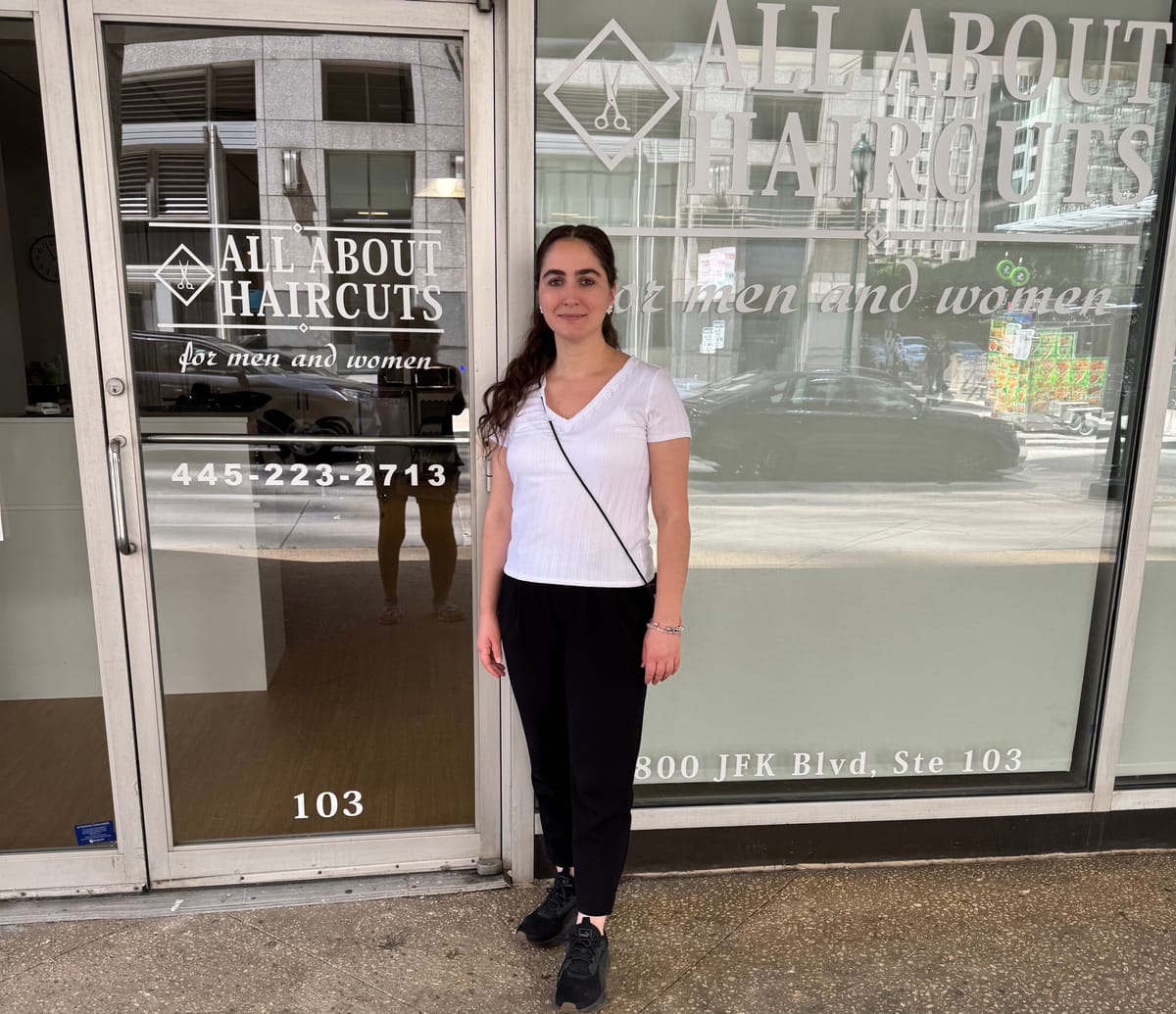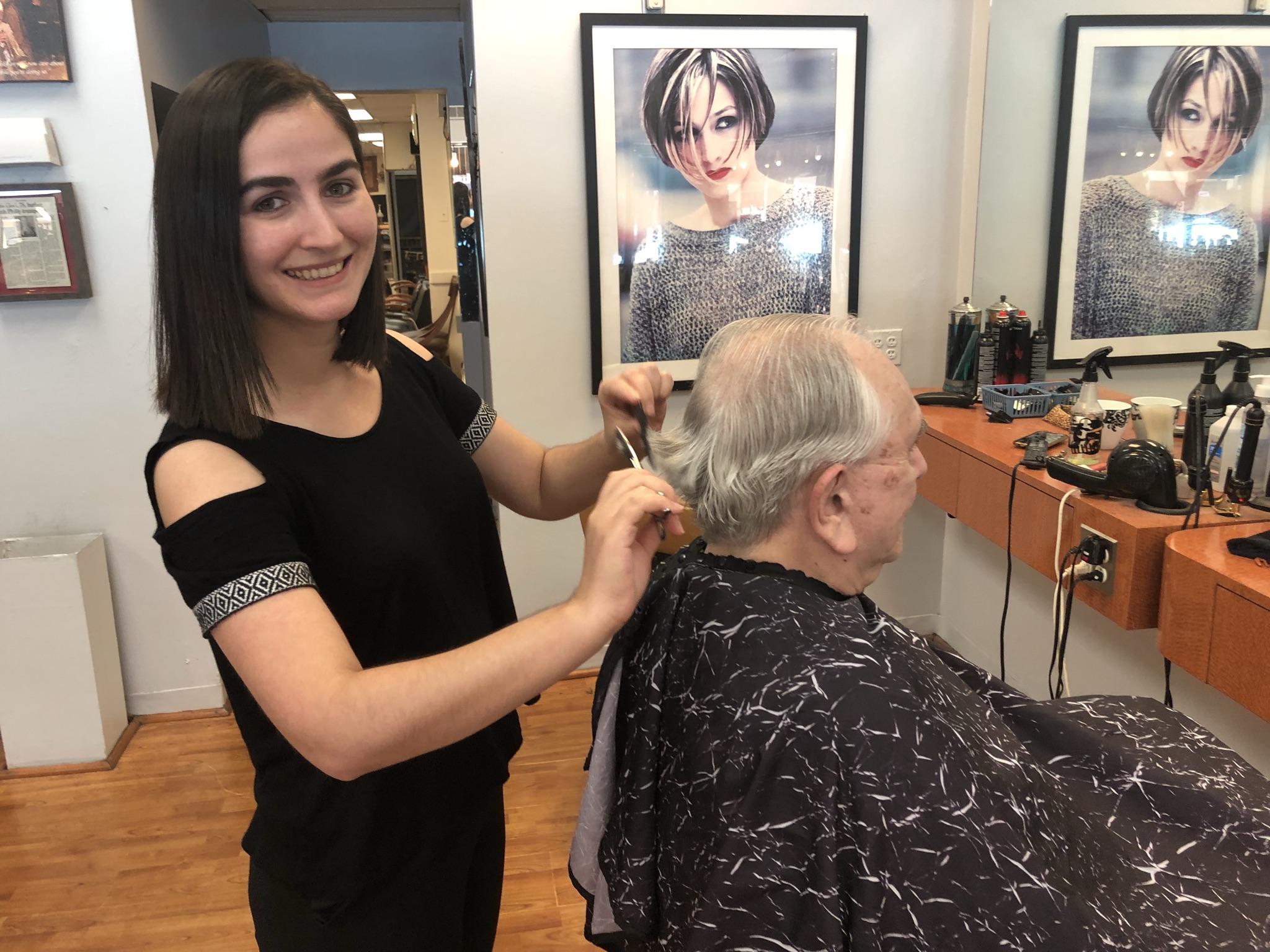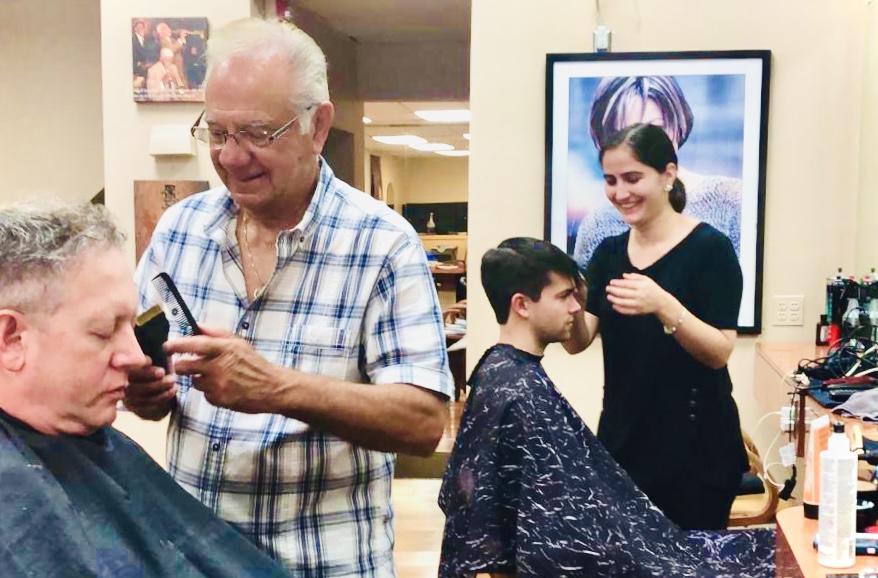Coming to America: A love story
She had already become a citizen. Now, she realized she was an American.

UPDATE: This story first appeared on June 13, 2021. Since then, mentor Lou Cioci has died, his wife Josie closed the barber shop and turned it over to Sule, where it just opened at 1800 John F. Kennedy Blvd.
The epiphany was like a lightning bolt, a brief flash in the dark.
Sule (pronounced Shula) Cakir was talking to her sister about a planned visit later this month to Turkey, from where she migrated when she was 7.
After the visit, the sister said, they would return home.
It struck Sule, for the first time, that “home” was the land she came to, not the land of her birth.

She had already become a citizen. Now, she realized she was an American.
It is a country in which she finds no fault, and where she was “adopted” by a man who placed into her willing hands a profession that would last a lifetime. But I am getting ahead of myself.
Her immigrant story began in 1998, when her father came across alone, looking for opportunity, which is the lure that attracts most immigrants these days.
And he found, like most immigrants, that while there was opportunity, it came through hard work. This doesn't frighten most immigrants.
He worked hard for 10 years, as a restaurant cook, to save enough to bring his family to him.
In those 10 years, Sule tells me, her mother raised four daughters in their hometown in Turkey, partly on money the father sent home, and on her salary as a hairstylist.
Sule is now 30 but was 17 when she arrived with her father and younger sisters. The youngest daughter remained in Turkey with their mother because Dad was unable to arrange papers for everyone. It took four more years before they got their green cards as legal immigrants and the family was complete for the first time in 15 years. [Writer’s note: The family asked me not to use their names.]
When Sule and her sisters arrived in 2007, they did not speak English. Not a single word, something you would not know listening to Sule, who has only the slightest whisper of an accent.
The family lived in the Northeast upon arrival and the sisters attended Roxborough High School, where they took ESL — English as a Second Language — classes.
How did that go?
Two sisters are graduates of Temple University — one with a degree in neuroscience and another with a degree in finance. The three sisters share a rented house in South Philly.
The youngest sister is 14 and Sule wants her to become a doctor, which doesn't seem far-fetched for this family. “This city needs a Turkish-speaking doctor. There is none,” Sule says.
As the eldest, Sule had to help out financially and got a job in a diner bussing tables. At the same time she also attended the Community College of Philadelphia, and studied hairdressing, mostly because that was her mother’s profession.
At the diner, while still unable to speak English, she was promoted to wait tables, maybe because of her good looks and welcoming smile. She learned a few phrases in English, such as, “Welcome, how may I help you?” and memorized the menu so she could understand people when they placed their orders.
She succeeded, then worked at a Center City kabob restaurant for a few years, but knew this was not the career she wanted.
While running an errand in Center City, she passed All About Hair, a good-sized hair salon on 19th near Chestnut, owned by Lou Cioci and his wife Josie.
Sule says, “Josie was sitting at the door and I told her I graduated from hair school, I had my license, but I can’t get a job because I have no experience. I would work for free" to learn the business.
Josie says, "I saw something in her face. She wanted to work, she was intelligent. I was drawn to her," but there were no openings.
“Josie saw the light in me, just an innocent girl,” says Sule.
Josie kept Sule's phone number and when a position opened a few months later, Sule was hired as a shampoo girl, she would be paid, and “she could watch and learn.”
It was 2011 and her life was about to change.
Lou took it from there.
When she arrived at All About Hair, she was wearing a hair covering, as do many Muslim women, although in Turkey, then a moderate Muslim state, it is more cultural than religious. It was no problem for Lou and Josie, who are Roman Catholic. They saw the girl beneath the scarf.
In 2015, Sule decided to no longer wear it, although her mother and a sister still wear the scarves.
Did she take it off because of any hate directed toward her?
“I never seen any hate from anybody, not even once, ” she tells me. “Nothing like that. I am comfortable. I love Philadelphia.” She found no hate in America, just acceptance.
Lou and Josie kind of adopted her, says Sule. When she had a toothache, they took her to their dentist. When she needed braces that would cost $100 a month for three years on time payments, Lou guaranteed she would earn enough to cover the cost.
“He never let me down. He was always there, ” Sule says. Josie and Lou “treated me like a daughter.”
Josie is embarrassed to hear that.
Sule shampooed customers, swept the shop and did whatever needed doing. She watched, she worked, she learned.
Lou taught her how to cut men's hair and she became a barber in the shop.

Lou had been my barber for more than 40 years. In addition to cutting hair, which gave him his life’s career, he was also a gifted trumpet player, he led a swing band, and was a supporter of the Clef Club on Broad Street. He chose scissors over the trumpet because he needed a steady income for his family, which includes daughter Monique.
He was my barber until prostate cancer stole him from us as the New Year began.
Sule is now my barber. Lou taught her well.
“I am so glad I met Lou, ” she says. “He helped me and I could help my sisters. Three lives are saved because of one person’s kindness.”
So this is a story of three kinds of love.
Sule’s love of her new country, her love of Josie and Lou, and the love of a Philadelphia couple for a smart, spirited, young Muslim girl at home in America.



